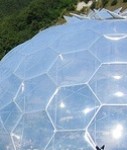Chapter II
The sun beats down. When you spit, it sizzles on the rocks. The sole time you were caught out in it, it fried your skull until you were sure that you could feel the waves of ultraviolet beating down on you in time to the throbbing of your brain. Never again.
The landscape across to the horizon is sere with occasional dots of green where the saguaros stand as mute sentries to the deep desert. The solitary blight on the beauty is the disused CAP pipeline that used to vampire the water from the Colorado River to fuel the nuclear power plant, both now abandoned since Mexico effectively bought back the south-west. You’re surprised at how much you remember; you thought that you’d slept through Lancaster’s history lessons, but clearly that wasn’t the case.
A breeze lighter than a spirit’s kiss carries the scent of rosemary, fighting for dominance with a spicy waft of thyme. A lizard skittering across the road away from the half-buried cistern breaks the silence. The lizard is tiny, whereas the cistern that your family uses to catch the rain is an old five thousand gallon gas tanker relined and resealed, now painted with Hopi Indian designs. Two of its four compartments are filled with gray water in various stages of leaching for use on the garden. Another holds the rainwater for drinking.
Some of that rainwater is run-off from raised patios and paths that separate sunken planting areas filled with dragon fruit and immigrant fruits – tomatoes, eggplants, and squash. Out the back from where you hear a couple of hens squabble are the bigger plants, nopal cactus and mesquite, as well as oranges, figs and pomegranates,. The hens alone – with you – have decided not to siesta today.
For as you shelter beneath the vase-like branches of a Chinese Pistache, picking a sliver of its peeling bark away and gaze around the undulating series of Indian terraces and basins that form the family’s yard with a melancholic surge of pride, you know the truth.
Though your parents and grandparents have spent the last forty years perfecting the system – selecting, breeding and refining the plants, covering much of the garden with black gauze cloth to reduce evapotranspiration by a third, optimizing the pipes running from the roof to the tank, even reshaping the road – it’s not enough. There is only so much water that can be wrung from the land, and the family has one thirst too many. The twins aren’t old enough to go, so you must.
Tomorrow.
At first light you’ll take your cycle and scoot over to Gran Tamales, and catch the daily bus from there to Tucson.
On To Chapter III
On To Chapter III

